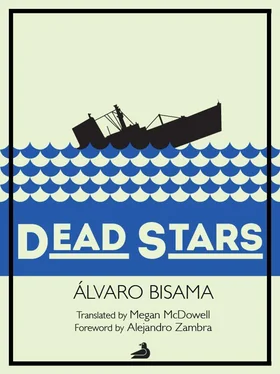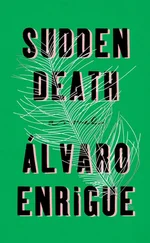I went to the hotel to see them. I remember I listened to the Dead Kennedys on the way there. A greatest hits cassette, she said. I don't know if I liked it, but I was still listening to punk, she said. At university, I only listened to punk. Then I stopped, cold turkey. You couldn't really listen to anything else with the port as a backdrop; it didn't allow you any peace. My memory of those years is just an infinity of songs playing one after another like a single indistinguishable murmur that has never left me. But I also feel like that murmur lasts for the time it takes for a second to die, or the time we're able to hold our breath before we have to exhale or start to suffocate, she said. That murmur is made of shouts. I think about that music and I think about Javiera and Donoso, too, about what happened to them, about this right now. Not that I understand much now, this article, this photo, she said. But that murmur is there, the whisper that was in my head when I went to see them. The singer destroying his voice over each chord, burning up in my ears. That static, the static of the port: all the misery placed out on the street in plain view, that city abandoned to its luck, that horrible Congress building that Pinochet built, the rotting fruit and the junk and the broken toys they sold along the edges of the market. It was all summed up by that hotel whose name I can't remember, that refuge for the desperate, the last possible stop before disappearing completely.
Some time later, an architect told me the history of the place. He'd done some work for the city and that's how he found out about it. Some of it I already knew and other things he confirmed. There's not a lot to tell. There was no telephone there. The rain gutters were clogged with pigeon shit. The electricity went out almost every day. It cost a third of what any other boarding house would have cost. The stove didn't work anymore; maybe it never had. The manager let some of the rooms out to the rent boys who worked the route between Plaza Victoria and the Delta pinball machines on Calle Pedro Montt and spent their nights in the diners on Calle Uruguay. He also rented rooms by the month or week. They called the guy the Gringo, and he barely spoke at all. He may have actually been Argentine or German. Or Chilean. Nothing repulsed the Gringo. He rented rooms to some of the hookers in exchange for sex. There were some transvestites there too. No one lasted very long. The place had a certain splendor to it once. The Gringo managed it because there were some problems with the property title. The rooms had high ceilings. You could still see the cracks from the earthquake of '85. It was full of cats, because it had once had a rat infestation. The cats filled the hallways with the stink of shit. Everything you can think of happened there: murder, suicide, robbery, rape. It didn't matter much to the Gringo, as long as whatever was owed got paid. A fire had devoured the top floor in the late eighties. An alcoholic lit a camp stove in his room. He died, along with an old lady who lived in the room next door. The Gringo never gave a thought to fixing it; he just closed off the entire floor. You could see clothes hung up in the hotel windows, almost always party dresses and towels. The hot water heaters didn't work, either. It didn't have much architectural value: the cornices and ornaments had crumbled off over time with the wind and humidity, and the bronze plating on the doors had been stolen, maybe by the tenants themselves, to sell off by the kilo. The art deco furniture in the reception area had the stuffing coming out of it, or was patched, or covered in grease stains. The Gringo took care of what little had to be done: he collected rent, waxed the floors once a century, changed the rubber washers in the bathroom faucets, brought buckets or pots to the rooms with leaky roofs. Not that he was overly concerned, she said. A window could stay broken for months, a rubber washer could be disintegrated for decades. There were days and weeks when the Gringo would disappear completely. No one knew what he did, where he went. But when he came back, he went on taking care of everything and running a little business selling bottles of pisco or cold beer to passers-by or the tenants, she said. No one cared about much of anything there. This was no hotel for artists or students. There were people living there who huffed glue, pickpockets who wanted to lie low for the night, retirees who would talk to themselves in the square. I heard all this from my architect friend, who'd had to inspect the place, take notes on everything. It wasn't a hotel, it was an end station, he told me.
The DKs sounded perfect there, she said. A soundtrack for the parade of ruin, she said.
How did they end up there? How the hell do you wind up in a place like that? I have no idea, but they did it. By then, they weren't thinking clearly. To sum up: Donoso had disappeared from classes, I didn't know if he was working anymore; Javiera had left the Party; they had lost a baby — no, more like Donoso had kicked Javiera so hard she had a miscarriage; Javiera had cheated on him with her ex-husband; they had made each other's lives hell, and they had forgiven each other. They walked around filled with black bile. Javiera told everyone that her whole life had been a sham, that the Party lied. That it was all a farce. I never saw them anymore. Anyway, they moved there, to that hotel. A friend of Javiera's told her about it. He'd spent an entire semester there because he didn't have the money for anything halfway decent. That semester he'd lived off of other students' leftovers in the cafeteria, she said. Javiera saw that as some kind of revolutionary heroism, a kind of rebel asceticism. They moved there on his recommendation. He told them about it after they got kicked out of a boarding house and didn't have anywhere else to go, because they already had a sort of black legend surrounding them. They packed up the little they had left in two knapsacks and moved. They paid two months' rent in advance. Then Javiera got pregnant again. The doctors advised absolute bed rest. She abandoned everything. She locked herself in their room. That's what my classmates from university told me, that she had disappeared because of the pregnancy. She almost never came out. She practically went crazy, shut up behind those walls whose paper had turned black with mold, with that bathroom that almost never worked, with the shouts of the building's drunks and mental cases. Donoso didn't stir from her side. Donoso stayed there with her and cooked lunch on a little gas stove they'd brought, and soothed her when she was stricken with nightmares or pain, she said.
That's how things were when I went to see them. The Gringo told me to go on up. I climbed an unlit staircase. The light was out in the hallway, too. Their room was on the third floor at the back. You couldn't see anything in the hall. It smelled like cat piss. I felt afraid. I didn't take my headphones off for even a second. The music was still there. The DKs. Holiday in Cambodia. I hung on tight to that sound, she said. I hung on to that desperation. To that urgency and those shouts. I hung on to Biafra's voice, thinking I was on the verge of collapsing at any second and that I would never be anything more, never again be anything but a body falling in darkness, she said. That noise made it possible for me to go on, to reach the end of the hall and knock on the door. Donoso opened. The room wasn't big. The window was open. You could hear the cars going by a block away on Avenida Argentina. It had gotten dark out. Javiera was lying on the bed, her eyes closed. The only light came from a candle. They didn't have any furniture other than a dresser, two chairs, and the bed. Donoso said we should keep our voices down; Javiera wasn't feeling well. I handed him some Coca-Colas and sandwiches. He offered me tea. I asked him how he was. I hadn't seen him in a long time. In the darkness, he looked cadaverous; the shadows in the room deepened the craters beneath his cheekbones. Javiera was breathing heavily. She was asleep. Donoso told me they were good, they were managing. That it was hard. He told me he didn't plan on going back to the university ever again. It wasn't for him. He was going to find a job. I asked him how things were with her. He didn't say anything. I realized then that Donoso never said anything, that he expressed himself through silence, words suspended in the air, facial expressions. At that moment, I realized why I'd never been attracted to him and why Javiera liked him, why she insisted on being with him, why she had thrown her life overboard for him. I didn't tell him any of what I was thinking. I kept quiet and listened to him talk in whispers about how they had come to the hotel, about what a delicate state Javiera was in. While she slept he told me how much he loved her. He told me about the violence he felt inside at the very idea of her absence. He told me about the physical pain he felt when he thought about being separated from her. He told me that sometimes he went down to see the Gringo and buy a bottle of cheap rum, which he would drink all by himself in the room, staring at the ceiling. He didn't mix the rum with anything. There was no ice. He said there was no difference between being drunk and being sober. She never said anything to him. Sometimes he'd serve her a little glass and she would drink it lying down. It helped her sleep. Then, he would embrace her and she'd stay there, her back pressed against him, and they would cry together. Or he would cry and she would listen to him. She hadn't heard any news from her son. When she phoned him in Ñuñoa, her ex asked her not to call anymore, to leave them alone. Donoso told her they didn't need him. He told me that soon they would have a child of their own, and they were going to get out of there. As he said this, I saw Javiera stretched out on her back, eyes closed, breathing slowly. I thought about how she could die in that position, she could just stop breathing and her body would remain there, inert, in that bed, lit only by the fluorescence of the street lights that filtered in through the holes in the curtains. When that thought hit me, I got the urge to leave. I told Donoso I had things to do, and that I would come back soon. I hugged him and told him to take care of himself. He didn't say anything to me. I went out to the hallway. I heard shouts coming from another room. I went down the stairs. The Gringo wasn't around. I went back out to the street. I put on my headphones but I never pressed play, I remained deaf, I didn't hear a thing.
Читать дальше





![Джеймс Чейз - Safer Dead [= Dead Ringer]](/books/430347/dzhejms-chejz-safer-dead-dead-ringer-thumb.webp)






